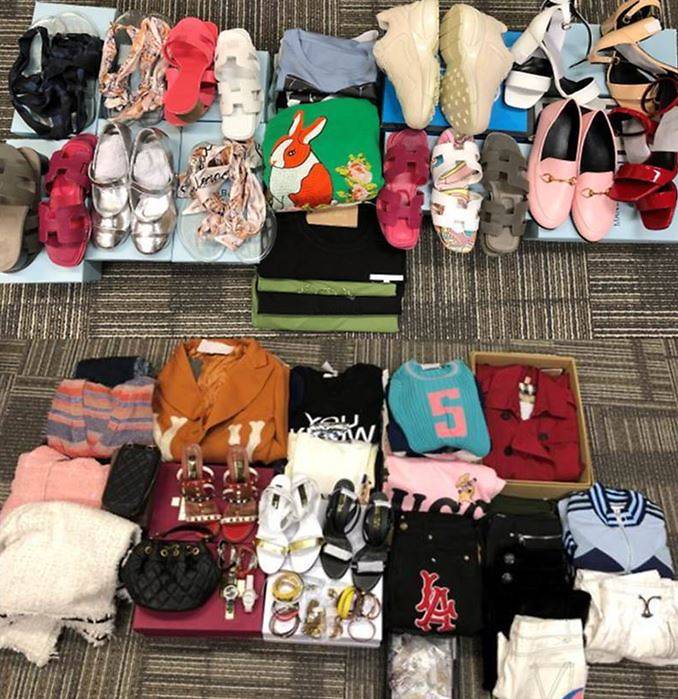SINGAPORE: A family of four pleaded guilty on Monday (Aug 17) to possessing fake branded goods for sale at Far East Plaza, after the items were bought from a wholesale centre in China and marked up by up to 300 per cent.
Tay Swee Seng, 54, and his wife, 44-year-old Wang Mingdan, operated three shops in Far East Plaza and had been in the retail business for more than a decade. Their shops in the building were raided on two occasions in 2018 and 2019.
They had another lease for a fourth shop in Far East Plaza that was managed by Wang’s daughter and son-in-law. The daughter Wang Jiawen and her husband Zhong Xiangrong are co-accused in the case.
The court heard that Tay and Wang started out selling women’s fashion in a shop at Orchard Central under the business Cristelle Fashion.
Wang was in charge of ordering and procuring the goods for sale in all three of the Cristelle Fashion shops.
She admitted buying the counterfeit branded goods in bulk from Guangzhou Wholesale Centre in China whenever she returned to her hometown twice or thrice a year.
During each trip, she would put in orders for about 200 to 300 pieces of apparel, shoes and fashion accessories from different shops, giving them a Singapore address for delivery.
Each item cost an average of about 20 to 30 yuan (S$3.95). Tay and Wang would mark up the price of the goods by 300 per cent to factor in overhead and other operation costs.
Investigations revealed that the average sales of each of the Cristelle Fashion shops was between S$11,000 and S$15,000 per month, with an average monthly profit of about S$3,000.
Tay and Wang both drew a salary of S$6,000 and received Central Provident Fund contributions from the company.
On top of this, Wang also ordered goods for her son-in-law to sell at his shop, which was called Muses.
On her advice, Wang’s daughter and son-in-law began selling the fake branded goods at Muses in March last year.
Initially, her son-in-law had ordered only unbranded goods for sale at his shop, but customers often requested for branded ones. Wang told her daughter and son-in-law that Far East Plaza customers were specifically looking for counterfeit branded goods.
After discussing the matter, the younger couple decided to take Wang’s advice, in the hope of boosting their sales and increasing profit.
Zhong and his wife marked up the prices of their fake goods by 250 per cent to 300 per cent to factor in overhead, material and salary costs.
They earned a monthly profit of about S$3,000 from the sale of the fake branded goods at Muses, and about S$2,000 from the unbranded items.
On average, they made between S$10,000 and S$15,000 in sales at Muses.
POLICE SEIZE GOODS
In November 2018, police officers raided one of Wang’s shops and seized counterfeit Chanel goods. Tay paid S$10,000 in compensation to Chanel in an out-of-court settlement, but continued to sell fake goods including with Chanel’s name.
In another raid on Jul 7 last year, police from the Intellectual Property Rights Branch raided three of Wang’s stores.
They found 110 counterfeit goods such as clothing, bags, jewellery purportedly from brands such as Valentino, Louis Vuitton, Balenciaga and Gucci.

Counterfeit items seized from Far East Plaza shops. (Photo: Singapore Police Force)
A similar raid at Zhong’s Muses shop uncovered 62 items such as shoes and clothes from purported brands such as Chanel and Gucci.
Wang pleaded guilty on Monday to eight offences under the Trade Marks Act, with her husband Tay admitting to intentionally aiding his wife in the same eight offences. Another 17 charges will be taken into consideration.
Wang’s daughter and son-in-law pleaded guilty to three similar offences with common intention, with another five charges taken into consideration.
The family’s lawyer asked for fines for his clients, saying that the goods were of low value and that their businesses was a genuine one albeit mixed with “infringing articles”.
In response, the prosecutor said the goods had been sold at marked up prices, and that the accused had diverted the sales away from the rightful trademark holders.
All four will return to court for sentencing on Aug 31.
For each count of having fake branded goods in their possession for sale, the accused can be jailed for up to five years, fined up to S$10,000 per item at a cap of S$100,000, or both.




